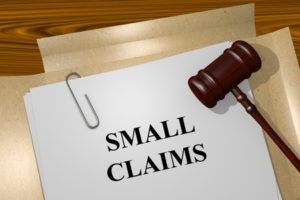In this article MLK Law professionals discuss when you may need to resort to Small Claims, what lies ahead, and what expenses it may bring.
Small Claims Court is a branch of Superior Court of Justices in Ontario, which deals with civil disputes of up to $25 000, excluding interest and fees. It offers simplified procedures and rules to court ruling attainment, therefore most Canadians prefer to settle their issues through Small Claims Court.
Generally, people turn to Small Claims Court for any of the following unresolved issues:
 unpaid accounts for goods or services sold and delivered
unpaid accounts for goods or services sold and delivered- unpaid loans
- unpaid rent
- NSF cheques
- property damage
- clothes damaged by a dry cleaner
- personal injuries
- breach of contract
How To Collect Your Money
Remember, that a court’s order does not give any guarantees of immediate payments. There are many known incidents in which the debtor has ignored judicial verdicts and fails to pay. However, if this person or company possesses any type of money or assets, you can do the following:
- Examination hearing – summon the debtor to appeal before court, where he/she will be obliged to present their financial information. Most common outcome for such a hearing is a settlement of a payment plan.
- Hire professionals – sometimes collecting a debt can become a lingering process, therefore many people prefer to transfer this matter to a collection agency, which, for the price of a percentage of the collected amount, will deal with the issue.
- Garnish a bank account – if you know the banking institution and branch of the debtor, you can oblige the bank to transfer an amount of outstanding debt to court, which will later be transferred to you.
- Garnish wages – you may contact the debtor’s employee and oblige him/her to transfer a portion of the wage to you through court.
- Place a lien – a lien is the right to hold the property of another until the debt has been paid. In other words, a debtor will not be able to sell a property until the amount of the judgement is paid to you from the sales revenue.
- Seize belongings – you may ask a sheriff to seize any personal belongings from the debtor that will cover the debt. This can be anything from a computer to transportation. However, you will have to pay expenses associated with this procedure, therefore it is crucial to ensure that the property belongs to the debtor, and that its value is sufficient to compensate the debt.
Out of the provided list above, garnishment is generally the fastest way to collect the debt. It allows the creditor to collect money directly from someone who owes the debtor money (employer, bank) . Garnishment orders are issued by the court.
Possible Expenses
Keep in mind that in Small Claims Court you have to pay for every step. Each case will have a different amount of steps. When one of the parties simply needs to request a trial date, the other will also have to pay fees for enforcing judgement and for summoned witnesses. Hiring a collection agency or summoning a sheriff should also be considered. Therefore, before filing your case think about how many steps are necessary to close the case.
A typical practice is that the prevailing party will request an unsuccessful party to proceed with their liabilities payment.
However, many prosecutors and defenders represent themselves. A party may also be represented by a lawyer or by a person authorized under the Law Society. If you are looking for a qualified and professional paralegal to handle your case, call MLK Law. With us you will always be in reliable hands.
